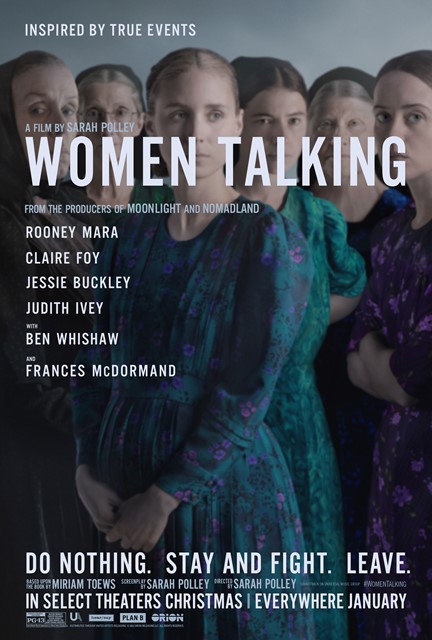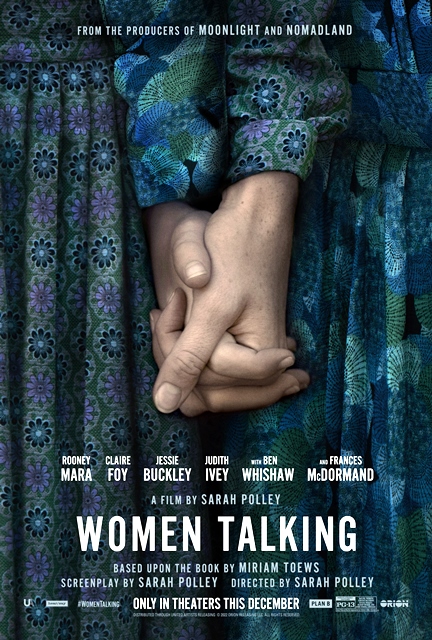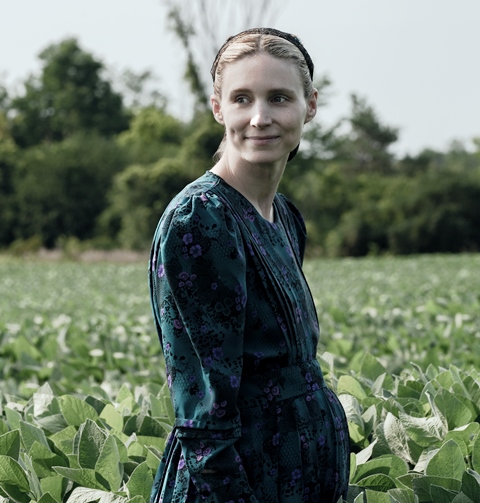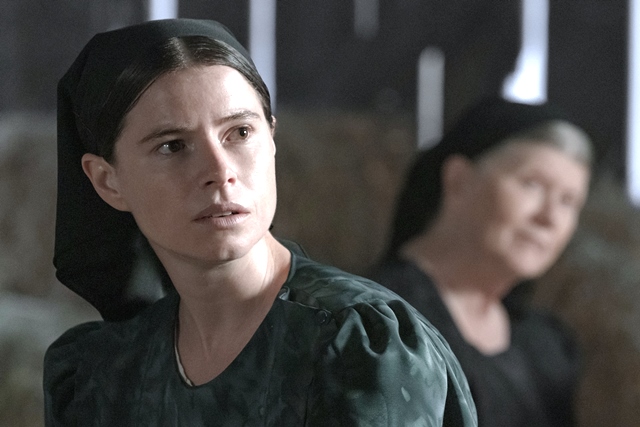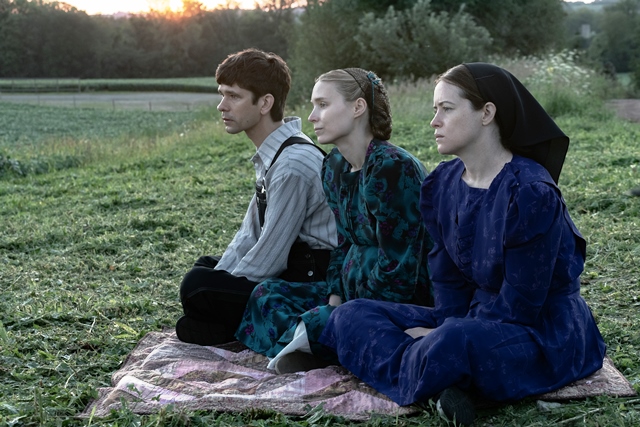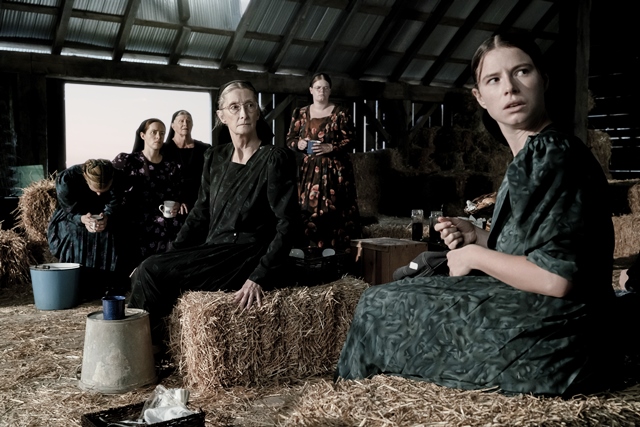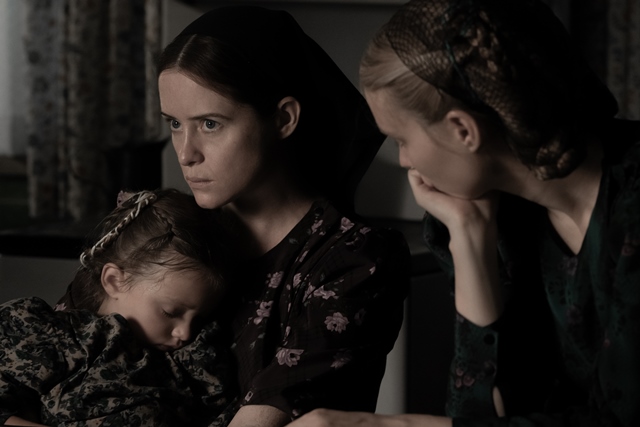Women Talking movie: sex, religion, #MeToo
By Rusty Wright
In the Oscar-winning film Women Talking, mysterious sexual assaults are plaguing a secluded religious community. Women and girls awaken drowsy, bruised, bleeding – some pregnant – as men drug them with cow tranquilizer and rape them at night. While the men are gone, the women debate whether to do nothing, stay and fight, or leave.
Set in 2010, MGM’s Women Talking traces their deliberations over 24 hours. It won the Academy Award for Adapted Screenplay and was nominated for Best Picture.
Based on Miriam Toews’ novel of the same name, the film probes the psychological, moral and spiritual core of the Christian community. Should the women forgive? Hold their assailants accountable? Demand justice and safety? The true story of similar assaults among a Mennonite community in Bolivia inspired the novel and film.
Male domination / female self-respect
The film presents a culture of male domination that clashes strongly with female desires for self-determination and respect. (Sound familiar?) Some of the women long to be able to think for themselves, to have their opinions matter, to read and write, be educated. Others fear disrupting their society. Many genuinely desire to honor their God. They want their children to be safe. They want hope and kindness.
They know they must act quickly. Authorities arrested some of the rapists, and the community’s men are in town arranging bail. Before departing, the elders ordered the women to forgive the assailants.
Women Talking has numerous touchpoints with modern global society. Do women have value? How to emerge from centuries of male domination? Can women have a social voice? When men sexually assault women, what are the consequences, and how to prevent it?
Forgiveness? Punishment?
And what if the assailants are Christians – even leaders? Is forgiveness appropriate? How should pacifists administer justice?
Under time pressure, eleven selected women and girls, including mothers, grandmothers and daughters, discuss their futures together in a barn loft. Pain, sorrow, and post-traumatic stress take their toll. Anger, fear, and rage manifest. Glimmers of hope emerge.
God is vengeful, so we can be, too, argue some. No, he forgives, so we should, too, say others. But why would an omnipotent God allow such evil to happen?
The women quote the Bible: “The Lord is gracious and compassionate; Slow to anger and rich in lovingkindness.” They pray, and sing a famous hymn, Nearer, My God to Thee.
Current church sexual assault scandals
The film’s themes evoke current news of male sexual assault in Christian contexts. Sex scandals have rocked both Catholic and Protestant churches. Current Christianity Today editor Russell Moore resigned his longtime national Southern Baptist Convention leadership role. About SBC sexual abuse and cover-ups, Moore wrote, “…anyone who cares about heaven ought to be mad as hell.”
I suspect that male insecurity – plus flawed emotional development – contributes partially to much of our culture’s male domination. Too often, men afraid of being exposed as weak, incompetent, timid, or uncertain compensate by grasping power, exercising it, and seeking to appear in control.
Strong, wise women
I’m extremely grateful that from childhood, all the women closest to me have been strong: my mother, grandmother, sister, and all three wives. (Not polygamous, but divorced, widowed, and very happily remarried.) They’ve taught me by example and love to value their wisdom and learn from their critique. I’m forever grateful.
Early in my first marriage, to a professional writer, a male friend asked if I ever felt intimidated by her writing accomplishments, which eclipsed mine back then. “Yes,” I replied. “So how did you handle that?” “I confessed it,” was my response.
An early follower of Jesus wrote, “If we confess our sins, [God] is faithful and righteous to forgive us our sins and to cleanse us from all unrighteousness.” Better to admit my flaws and base my self-esteem on faith rather than on comparative accomplishments. She was my first speaking and writing coach, and much of the modest success I’ve seen stems from her influence.
Women Talking is gripping, thought provoking, and instructive in our #MeToo world. A surprise element for me was including the Monkees’ song Daydream Believer – not expected in a film about a restrictive religious community. But it highlights a touching love story. Academy Award well deserved.
Rated PG-13 (USA) “for mature thematic content including sexual assault, bloody images, and some strong language.”
https://www.mgmstudios.com/women-talking/home In US theaters now
International release dates (6 continents)
Rusty Wright is an author and lecturer who has spoken on six continents. He holds Bachelor of Science (psychology) and Master of Theology degrees from Duke and Oxford universities, respectively. www.RustyWright.com
Copyright © 2023 Rusty Wright
# # #
Editors: Note pictures below. For access to these and more, check here, here, here, here, and here.
